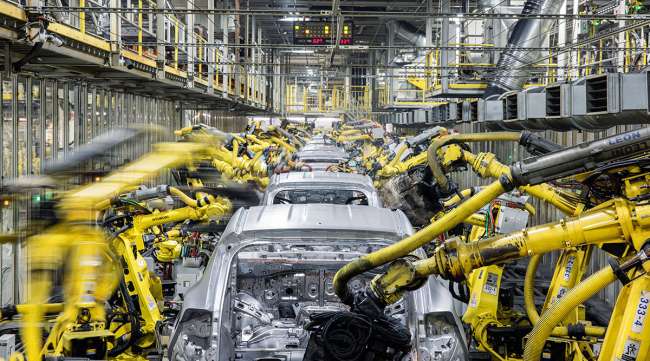A car factory in Slovakia. (Akos Stiller/Bloomberg News)
As the fallout from President Donald Trump’s tariff plans comes into relief, a harsh truth is emerging for the automotive industry: There are lots of losers and not many winners.
From South Korea’s Hyundai Motor Co. to Germany’s Volkswagen AG and America’s own General Motors Co., many of the world’s most prominent carmakers will soon face sharply higher costs from Trump’s new levies on auto imports and key components.
“There are very few winners,” Sam Fiorani, vice president of global vehicle forecasting for AutoForecast Solutions, said in a phone interview. “Consumers will be losers because they will have reduced choice and higher prices.”
One notable winner in the tariff chaos: Elon Musk. Tesla Inc. has large factories in California and Texas that churn out all the electric vehicles it sells in the U.S. Ford Motor Co., too, could face a less severe impact than some rivals, with about 80% of the cars it sells in the U.S. being built domestically.
Starting next week, the new 25% tariffs will apply to all imported passenger vehicles and light trucks, as well as key parts like engines, transmissions and electrical components, on top of any duties already in effect.

The tariffs give automakers that heavily source parts in the U.S. an edge, and Trump also allowed an exemption: The new levies will only apply to the non-U.S. share of vehicles and parts imported under a free-trade agreement with Canada and Mexico.
That stands to soften the blow for vehicles whose supply lines zig-zag across the continent. Tariffs on parts from Canada and Mexico that comply with the trade deal also won’t take effect until the U.S. sets up a process to collect those levies.
The U.S. neighbors could use that window to try to stave off full implementation, even if it’s a long shot.
Nick Darman of Alvys discusses the evolution of transportation management systems and workflow automation, while David Bell of CloneOps.ai shares insights from the Manifest 2025 supply chain innovation conference. Tune in above or by going to RoadSigns.ttnews.com.
The move is nonetheless a broadside against the continent’s free-trade agreement that Trump renegotiated during his first term in office that has given rise to a closely integrated supply chain spanning North America. Canadian Prime Minister Mark Carney called the tariffs a “direct attack.”
Foreign brands heavily reliant on imported vehicles will face the most pressure. South Korea’s Hyundai risks being among the hardest hit. Although the carmaker and its affiliate Kia have plants in Alabama and Georgia — and announced a $21 billion U.S. expansion plan this week — it imported more than 1 million vehicles to the U.S. last year, accounting for more than half of its sales in the country, according to figures from Global Data.
Hyundai “remains committed to the long-term growth of the U.S. automotive industry through localized production and innovation,” the company said in a statement, noting it employs 570,000 people in the U.S.
Hyundai and Kia may have to pay as much as 10 trillion won ($7 billion) every year for tariffs to the U.S. if the 25% tariffs are executed, according to Hyuk Jin Yoon, Seoul-based analyst at SK Securities Co. That accounts for nearly 40% of total operating profit that the two carmakers earned in 2024.
And despite having four assembly plants spread across Kentucky, Indiana, Mississippi and Texas, plus engine plants in West Virginia and Alabama, Toyota Motor Corp., the world’s biggest automaker, imports about half of what it sells in the U.S.
Detroit’s carmakers weren’t spared, either. GM imports some Chevrolet Silverado pickup trucks from plants in Mexico and Canada, the entry-level Chevy Trax compact SUV from South Korea and its family car, the Chevrolet Equinox crossover SUV. Last year, GM sold more than 200,000 each of the Equinox and Trax, which are among its cheapest vehicles. The automaker also makes electric versions of the Equinox and Blazer in Mexico.
Stellantis NV makes the Jeep Compass and Wagoneer S SUVs in Mexico. The company imports its Chrysler Pacifica minivans from Canada and compact Dodge Hornet and Fiat 500 from Italy.
And even though Ford is more U.S.-reliant than its cross-town rivals, it faces pain of its own. The carmaker builds its entry-level Maverick small pickup in Mexico as well as the Bronco Sport compact SUV and Mustang Mach-E electric vehicle.







